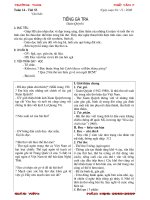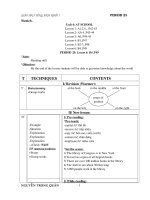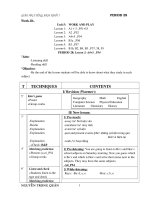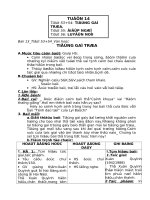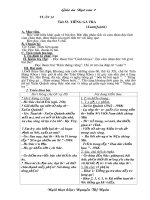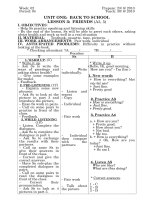anh 7 tuần 14
Bạn đang xem bản rút gọn của tài liệu. Xem và tải ngay bản đầy đủ của tài liệu tại đây (127.15 KB, 9 trang )
<span class='text_page_counter'>(1)</span><div class='page_container' data-page=1>
<b>UNIT 7. THE WORLD OF WORK</b>
<b>I. Aims: helping students:</b>
- to discuss schedules and routines
- to talk about vacations
- to talk about occupations
<b>II.Language focus:</b>
- adjectives: making comparisons
<b>III. Allocation:</b>
Lesson 1 A1 Talking about a student’s work and
practising the comparatives with “fewer
more/ earlier and later”
Lesson 2 A2-3 Reading for details to compare American
students’ vacation and Vietnamese
students’ vacation
Lesson 3 A4 Reading for details about Mr Tuan’s
work to compare a Vietnamese typical
working day and an American typical
working day
Lesson 4 B1 Reading for details about an American
family to understand their work and
vacation
Lesson 5 B2-4 Reading for details about Mr Tuan’s to
work to compare a Vietnamese typical
working day and American typical
working day. Listen for details about
peoples’ jobs, work and vacation
<b>IV.Vocabulary.</b>
<b> Verbs</b>
Last, celebrate,
review, take care of,
play golf, repair
<b> Adjectives</b>
Early, late, together,
quite hard, typical,
lazy, keen
<b> Nouns</b>
</div>
<span class='text_page_counter'>(2)</span><div class='page_container' data-page=2>
Date of preparation:……… Period 40th
<b>Unit 7 : THE WORLD OF WORK</b>
<b>Lesson1 – Section A - A STUDENT’S WORK ( A1 )</b>
<b>I.Objectives : At the end of this period, ss will be able to talk about Ss’ work as well</b>
as to talk about holidays and vacations and pratice comparatives with “ Fewer/
more” to talk about a student’s work.
<b>1.Language contents:</b>
* Grammar: - Present tense and future tense.
- Comparison
* Vocabulary: quite, hard, an hour, (to) last, late …
<b>2. Skill: Listening, Speaking, Reading and Writing.</b>
<b>3. Attitude: It helps ss to have motivation, happiness to communicate with each </b>
other in English. Besides, the lesson can help ss work harder and get moral sense.
<b>II.Teaching aids.</b>
<b>1. Teacher: lesson plan, textbook and stereo.</b>
<b>2. Students: textbook, notebook and workbooks.</b>
<b>III.Techniques: Ask and answer, pair work, chatting,Rub out and remember, </b>
<b>pelmanism </b>
<b>IV. Procedures.</b>
<b>1.Organization(1’).</b>
<b>Lớp</b> <b>Ngày giảng</b> <b>Vắng</b>
<b>7E</b>
<i><b>2.Checking the old lesson(5’). </b></i>
- T asks SS to go to the board and write the new words, newstructures and do
exercises.
- T corrects the mistakes and gives marks.
<b>3.New lesson.</b>
<b> Teacher & ss’ activities</b> <b>Contents</b>
<b>Step 1.Warming up</b>
T: Ask Ss some questions
Ss: Try to answer
T: Remark and give marks
<b>Step 2.Presentation</b>
T: ask some questions.
- Show the picture : Now lass, you will
hear the conversation between Hoa and
her uncle about school work- Notice
<b>* Chatting(3’)</b>
1. What time do your classes start?
2. What time do they finish?
3.How many hours do you do your
homework a day ?
<b>A1.Listen. Then practice with a partner.</b>
<b>* Setting the scene(1’)</b>
- Do you often go to school every
morning?
</div>
<span class='text_page_counter'>(3)</span><div class='page_container' data-page=3>
what Hoa talks about her daily
activities and vacation.
T: elicit the new words.
Model them
Ss: repeat in chorus, individual.
T: write them on the BB.
Ss: give meaning
Copy down
T: ask ss to repeat the words loudly in
chorus
Rub out word by word but leave the
circles.
Go on until all the circles are empty
Ask ss to go to the board and write the
words in their correct circles.
T: ask ss to guess the answers.
T: let ss to listen tothe tape.
Ss: listen and read in chorus, in groups
T: ask ss to read the dialogue again to
check the answers.
T: give feedback and correct if
necessary.
T: elicit the model sentences from the
students.
<b> Step 3.Practice</b>
T: run through the cues.
model the first cue.
Ss: listen and repeat in chorus and
individual.
Do the rest.
<b>Step 4.Production</b>
T: ask ss to choose the card with the
right words
- What time do your classes start and
finish?
<b>1. Vocabulary(6’)</b>
- an hour(example)
- (to) last(translation)
- hard(translation + example)
Ex: I always work hard .
- late- later - early- earlier
- few- fewer - many- more
- quite(translation)
<b>* Checking vocabulary(3’): Rub out </b>
<b>and remember.</b>
<b>2. Pre- questions(6’): (a -> c – textbook).</b>
a. What time do Hoa’s classes start and
finish?
b. Do your classes start earlier or later?
c. For how many hours a day does Hoa do
her homework?
<b>3. Presentation dialogue(7’): A 1 on </b>
<b>page 72.</b>
<b>* Checking the questions.</b>
a. They start at 7.00 and finish at 11.15.
b. My classes start earlier.
c. Hoa does her homework 2 hours a day.
4. Answer the questions
d. She’ll go and see her parents on their
farm.
e-g: Students’ answers
<b>* Model sentences(5’)</b>
<i>-My classes start earlier than Hoa’s </i>
<i>classes.</i>
</div>
<span class='text_page_counter'>(4)</span><div class='page_container' data-page=4>
a. Hoa’s classes / 7.00
Our classes / 6.45
<b>a. The film / 8. 45 </b>
<b>b. The play / 10.00</b>
<b>c. Hoa / 2 hours </b>
<b>d. Miss Lan / 4 hours</b>
<b>4.Consolidation(1’).</b>
<b>5. Homework(2’): Ask ss to learn all lesson and do exercises at home.</b>
<b> Prepare A 2,3.</b>
<b>V.Evaluation:</b>
………
………
Date of preparation:……….. Period 41
<b>Unit 7 : THE WORLD OF WORK</b>
<b>Lesson 2 – Section A- A STUDENT’S WORK ( A2- A3 )</b>
<b>I.Objectives: At the end of this period, ss will be able to know and write a letter and</b>
<b>know some special days in the year.</b>
<b>1.Language contents:</b>
* Grammar: - Present tense and future tense.
- Comparison
* Vocabulary: Easter, Thanksgiving, fewer, more.
<b>2. Skill: Listening, Speaking, Reading and Writing.</b>
<b>3. Attitude: It helps ss to have motivation, happiness to communicate with each </b>
other in English. Besides, the lesson can help ss work harder and get moral sense.
<b>II.Teaching aids.</b>
<b>1. Teacher: lesson plan, textbook and stereo.</b>
<b>2. Students: textbook, notebook and workbooks.</b>
<b>1.Organization(1’).</b>
<b>Lớp</b> <b>Ngày giảng</b> <b>Vắng</b>
<b>7E</b>
<i><b>2.Checking the old lesson(5’). </b></i>
- T asks SS to go to the board and write the new words, newstructures and do
exercises.
</div>
<span class='text_page_counter'>(5)</span><div class='page_container' data-page=5>
<b>3.New lesson.</b>
<b>Teacher & ss’ activities</b> <b>Contents</b>
<b>Step 1.Warming up(5’): Chatting.</b>
T& Ss ask and answer some questions
<b>Step 2.Pre- reading</b>
T: Set situation by asking some
questions
T: elicit the new words.
Model them
Ss: repeat in chorus, individual.
T: write them on the BB.
Ss: give meaning
Copy down
T: ask ss to repeat the words loudly in
chorus
Rub out word by word but leave the
circles.
Go on until all the circles are empty
Ask ss to go to the board and write the
words in their correct circles.
T: ask ss to guess True or False for each
statement.
<b>Step 3.While- reading</b>
T: ask ss to read the text and check their
prediction.
T: ask ss to read the text again and work
in pairs to fill in the grids A 2 on page
1. What time do your classes start?
2. What time do they finish?
3. What do you do in your free
time?
4. What will you do on this
vacation?
<b>A2. Read. Then answer the </b>
<i><b>questions:</b></i>
<b>* Setting the scene(1’)</b>
- Do you go to school on
weekends?
- How about New year’s days?
<b>a. New words(5’)</b>
- 4 of July
* Few – Fewer *
More
- (to) celebrate(translation)
-> celebration
- New year’s Eve(example)
- Independence day(example)
- Christmas(example)
- Thanksgiving (example)
- Easter(example)
<b>* Checking(5’): What and where.</b>
<b>* True or false statements(5’): A </b>
<b>2 on page 73.</b>
a. Vietnamese students have fewer
vacations than American ss.
</div>
<span class='text_page_counter'>(6)</span><div class='page_container' data-page=6>
73.
T: give feedback.
Correct if necessary.
- Ask Ss to read the letter again and
answer the questions in pairs
- Call some pairs to present in front of
the class
<b> Step 4.Post- reading</b>
T: ask ss to guess the public holidays
and then listen and check their
prediction.
T: give feedback.
vacation in the winter.
c. They don’t have a Tet holiday.
d. Their most important vacation is
New Year’s Day.
e. They usually spend their time
with their families on Thanksgiving
and Christmas Day.
<b>* Checking the prediction(5’)</b>
T F T F T
<b>* Grids(3’).</b>
<b>Vacations: Vietna</b>
<b>mese ss.</b>
<b>Americ</b>
<b>an ss.</b>
<i>- the longest</i>
<i>vacation</i>
<i>- Tet </i>
<i>holiday</i>
<i>- </i>
<i>Thanksgivin</i>
<i>g</i>
<i>- Christmas</i>
<i>- </i>
<i>Independen</i>
<i>ce Day</i>
<i>- Easter</i>
<i>- New </i>
<i>Year’s Day</i>
<b>In the </b>
<b>summe</b>
<b>r</b>
<b>V</b>
<b>X</b>
<b>X </b>
<b>Septem</b>
<b>ber 2nd</b>
<b>X</b>
<b>Lunar </b>
<b>day </b>
<b>30th</b>
<b>X</b>
<b>V</b>
<b>V</b>
<b>July </b>
<b>4th</b>
<b>V</b>
<b>Januar</b>
<b>y 1st</b>
<b>* Answer the questions(5’) (P. </b>
<b>74)</b>
a. American longest vacation is in
the summer.
b. He usually spends time with his
family on the vacation.
c. Vietnamese students have fewer
vacation than American students.
<b>* Write the public holidays(2’)</b>
<i><b>Contents: Tim enjoys all the public </b></i>
<i>holidays. At christmas, he always </i>
<i>gets a lot of gifts.</i>
</div>
<span class='text_page_counter'>(7)</span><div class='page_container' data-page=7>
<i>turkey and a lot of good food.</i>
<i>In Tim’s hometown, there is always</i>
<i>a large firework display on </i>
<i>Independence Day. Timlikes New </i>
<i>Year because he can stay up untill </i>
<i>midnight and celebrate with his </i>
<i>parents.</i>
<b> Answer keys:</b>
<b>a. Thanksgiving 2</b>
<b>b. Independence Day 3</b>
<b>c. New year’s Eve 4</b>
<b>d. Christmas 1</b>
<b>4. Consolidation(1’).</b>
<b>5.Homework(2’): Ask Ss to learn all the names of the public holidays.</b>
Do exercises and prepare next period - Teacher’s day
<b>V.Evaluation:</b>
………
………
………
………
Date of preparation: ………. Period 42
<b>Unit 7 : THE WORLD OF WORK</b>
<b>Lesson 3 – Section A- A STUDENT’S WORK (A4 )</b>
<b>I.Objectives: At the end of this period, ss will be able to discuss schedules and </b>
routines and read for details about a typical student’s life.
<b>1.Language contents:</b>
* Grammar: - Present simple tense
- Comparison
* Vocabulary: - typical, period, keen on, definitely, lazy.
<b>2. Skill: Listening, Speaking, Reading and Writing.</b>
<b>3. Attitude: It helps ss to have motivation, happiness to communicate with each </b>
other in English. Besides, the lesson can help ss work harder and get moral sense.
<b>II.Teaching aids.</b>
</div>
<span class='text_page_counter'>(8)</span><div class='page_container' data-page=8>
<b>1.Organization(1’).</b>
<b>Lớp</b> <b>Ngày giảng</b> <b>Vắng</b>
<b>7E</b>
<i><b>2.Checking the old lesson(5’). </b></i>
- T asks SS to go to the board and write the new words, newstructures and do
exercises.
- T corrects the mistakes and gives marks.
<b>3.New lesson.</b>
<b>Teacher & ss’ activities</b> <b>Contents</b>
<b>Step 1.Warming up</b>
T: Let ss write again some public
holidays in VN & USA.
<b>Step 2.Pre- reading</b>
T: ask some questions.
T: elicit the new words.
Model them
Ss: repeat in chorus, individual.
T: write them on the BB.
Ss: give meaning
Copy down
T: ask ss to repeat the words
loudly in chorus
Rub out word by word but leave
the circles.
Go on until all the circles are
empty
Ask ss to go to the board and
write the words in their correct
circles.
<b>* Network (3’).</b>
Tet holiday
<b>A4. Read. Then answer the questions:</b>
<b>* Guiding questions (3’).</b>
1. What do you do every day?
2. Is your work at school hard or Ok?
3. How many hours do you study a day ?
4. Do you have to do a lot of homework?
<b>1. Vocabulary(5’).</b>
- period = class
- definitely: = surely
- (to) review ( trans)
- typical ( example)
- keen ( trans.)
-> (to) be keen on … = intelligent
- lazy ( antonym)# hard
<b>* Checking vocabulary(5’).</b>
Rub out and remember
<b>* Grammar(3’).</b>
</div>
<span class='text_page_counter'>(9)</span><div class='page_container' data-page=9>
- Introduce the passage and give
some new words, remind structure.
Then practice them
Ss: Listen and copy down.
T: ask ss to guess the numbers.
T: give feedback.
<b> Step 3.While- reading</b>
T: ask ss to read the text and check
their prediction.
T: ask ss to read the text again and
work in pairs to answer the
questions of A 4on page 75.
T: give feedback.
Correct if necessary
<b> Step 4.Post- reading</b>
- Ask ss to take a survey in goups
_ fewer…………. than: ít hơn
_ more…….... than: nhiều hơn
<b>2. Prediction(3’).</b>
<b>a. Hoa goes to school six days a week.</b>
<b>b. She has five periods a day.</b>
<b>c. She works twenty hours a week.</b>
<b>d. She has about twelve hours of homework </b>
every week.
<b>* Checking the prediction(4’)</b>
a. six b. five c. twenty d.
twelve
<b>*Comprehension questions(5’) : A4 on </b>
<b>page 75.</b>
a. Because they only work a few hours a day
and have long vacations.
b. She works twenty hours a week.
Yes, it is.
c. ( Students’ answer)
d. No, he doesn’t.
<b>4. Consolidation(1’).</b>
<b>5.Homework(2’): - Practise more at home and do more exercises.</b>
- Prepare B 1.
<b>V.Evaluation:</b>
………
………
………
………
Ngày...
Tổ duyệt
</div>
<!--links-->
